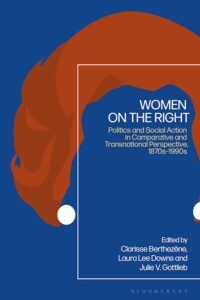
Women on the Right
Politics and Social Action in Comparative and Transnational Perspective, 1870s-1990s
Publication | Table des matières
Résumé
Women on the Right explores the complex relationships between conservative and right-wing politics, social action, and women actors from the late 19th to the late 20th century. Edited by Clarisse Berthezène, Laura Lee Downs, and Julie V. Gottlieb, each essay examines the spectrum of women’s engagement with right-wing politics, from centrist and ‘progressive conservatism’ groups, to authoritarianism and fascism.
This book uses local and national case studies to explore a wide range of women’s social and political mobilizations. Using a bottom-up perspective, it stays focused on the ideas, ambitions, and practices of the actors themselves. Key points of comparison include: the very different roles played by religious institutions and associations, the broader regional and national contexts, and the dynamics that favour – or not – the eventual construction of welfare states. Women on the Right consistently adopts a multinational and multidimensional approach, by bringing together a team of expert contributors to engage in a discussion of the comparative and transnational features of right-wing women’s political thought and practice. The result is a unique contribution to the historical understanding of women’s participation in – and ideas about – conservative activism.
Table des matières
Introduction, Clarisse Berthezène (Université de Paris, France), Laura Lee Downs (EUI, Italy), and Julie V. Gottlieb (University of Sheffield, UK)
1. Joan of Arc was Nationalist and Feminist without a Label: Women’s Engagement in the Action Française (1898-1940), Camille Cleret (Sciences Po, France)
2. Catholic Women and Social Action in Spanish Social Catholicism, 1898-1931, Immaculada Blasco Herranz (University of La Laguna, Spain)
3. Between Organizing on Behalf of and for Themselves: Confessional Organizations for the Polish Female Laity 1900-18, Dominika Gruziel (EUI, Italy)
4. The Catholic Women’s Movement in Austria (Katholische Frauenbewegung, Katholische Reichsfrauenbewegung), Irene Bandhauer-Schöffmann (University of Vienna, Austria)
5. Right Wing Women and Social Action: The Case of the Consiglio Nazionale delle donne Italiane, 1903-1939, Anne Cova (University of Lisbon, Portugal)
6. The Limits of Right-Wing Women’s Rights Activism Under a Counter-Revolutionary Regime: The Case of Hungary, Judith Szapor (McGill University, Canada)
7. ‘Enemy Peoples Now Joined in Brotherhood’: Gender, Social Action and Nationalist Politics in the Upper Adriatic, 1919-1948, Laura Lee Downs (EUI, Italy)
8. ‘Emancipation’ from the (Far) Right: Gender and Political Action in the Romanian Legionary Movement, Anca Diana Axinia, (EUI, Italy)
9. British Nationalist Feminism in the Sphere of International Relations in the Interwar Period, Julie V. Gottlieb (University of Sheffield, UK)
10. Nurses, Social Action, and Female Identity in the Spanish Civil War and Early Franco Dictatorship (1937-47), Ángela Cenarro (University of Zaragoza, Spain)
11. The Mobilization of Women’s Voluntary Associations by the British Conservative Party: The Case of the Women’s Voluntary Services, Local Government, and the Debate around the Role of Voluntary Social Service in the British Welfare State, 1945-47, Clarisse Berthezène (Université de Paris, France)
12. A Turkish Woman between Sufi Islam, Gender, and the Cold War: The Contradictory Path of Samiha Ayverdi (1905-1993), Zeynep Bursa-Millet (EHESS, France)
13. Liberal-Conservative Women and the Second Wave of Feminism in Sweden, Helena Tolvhed (Stockholm University, Sweden)
14. Women in Right-Wing Ecology in West Germany, 1970s-1980s, Lauren Stokes (Northwestern University, USA)
Conclusion, Krista Cowman (University of Leicester, UK)
